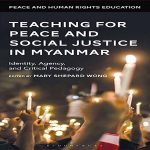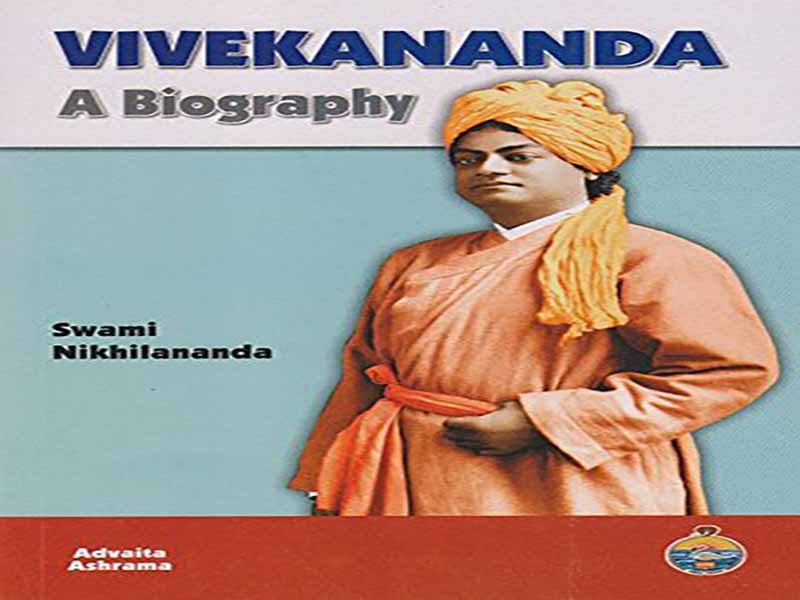- عنوان کتاب: Vivekananda / A Biography
- نویسنده: Swami Vivekananda
- حوزه: بیوگرافی
- سال انتشار: 1953
- تعداد صفحه: 215
- زبان اصلی: انگلیسی
- نوع فایل: pdf
- حجم فایل: 1.09 مگابایت
آمریکا در دهه آخر قرن نوزدهم و دهه اول قرن بیستم. راهب ناشناخته هندی به طور ناگهانی در پارلمان ادیان که در شیکاگو در سال 1893 برگزار شد و در آن نماینده هندوئیسم بود به شهرت رسید. دانش گسترده او از فرهنگ شرق و غرب و همچنین بینش عمیق معنوی، شیوایی پرشور، گفتگوی درخشان، همدردی گسترده انسانی، شخصیت رنگارنگ و چهره زیبا جذابیت مقاومت ناپذیری برای بسیاری از آمریکایی هایی که با او در تماس بودند ایجاد کرد. افرادی که حتی یک بار Vivekananda را دیده یا شنیده اند، پس از گذشت بیش از نیم قرن هنوز خاطره او را گرامی می دارند. در آمریکا مأموریت ویوکاناندا تفسیر فرهنگ معنوی هند، به ویژه در محیط ودانتیک آن بود. او همچنین سعی کرد از طریق آموزه های عقلانی و انسان گرایانه فلسفه ودانتا، آگاهی دینی آمریکایی ها را غنی کند. او در آمریکا سفیر روحانی هند شد و با شیوایی برای درک بهتر بین هند و دنیای جدید به منظور ایجاد ترکیبی سالم از شرق و غرب، از دین و علم درخواست کرد. ویوکاناندا در سرزمین مادری خود به عنوان قدیس میهن پرست هند مدرن و الهام بخش آگاهی ملی خفته او در نظر گرفته می شود. برای هندوها او آرمان دین نیروبخش و انسان ساز را موعظه کرد. خدمت به انسان به عنوان تجلی مشهود الوهیت، نوع خاصی از عبادت بود که او برای سرخپوستان از آن حمایت می کرد، همان گونه که آنها به آداب و اسطوره های ایمان باستانی خود اختصاص می دادند. بسیاری از رهبران سیاسی هند به طور علنی به بدهکاری خود به سوامی ویوکاناندا اذعان کرده اند. ماموریت سوامی هم ملی و هم بین المللی بود. او که عاشق نوع بشر بود، تلاش کرد تا صلح و برادری انسانی را بر اساس معنوی یگانگی وداستانی هستی ترویج دهد. ویوکاناندا که یک عارف عالی رتبه بود، تجربه مستقیم و شهودی از واقعیت داشت. او عقاید خود را از آن منبع بیوقفه حکمت میگرفت و غالباً آنها را به زبان روحانگیز شعر ارائه میکرد. گرایش طبیعی ذهن ویوکاناندا، مانند ذهن استادش، راماکریشنا، این بود که بر فراز جهان اوج بگیرد و خود را در تأمل در امر مطلق فراموش کند. اما بخش دیگری از شخصیت او با دیدن درد و رنج بشر در شرق و غرب به طور یکسان خونریزی کرد. ممکن است به نظر برسد که ذهن او به ندرت در نوسان خود بین تفکر در مورد خدا و خدمت به انسان، نقطه سکون پیدا می کند. به هر حال، او در اطاعت از دعوتی بالاتر، خدمت به انسان را به عنوان مأموریت خود در زمین برگزید. و این انتخاب او را برای مردم غرب، به ویژه آمریکایی ها، محبوب کرده است. او به فعالیتهای عمومی اختصاص داشت – و همچنین در میان رنجهای جسمی حاد – او چهار اثر کلاسیک خود را برای آیندگان به یادگار گذاشت: جانانا-یوگا، باکتی-یوگا، کارما-یوگا و راجا-یوگا، که همگی رسالههای برجستهای هستند. در مورد فلسفه هندو علاوه بر این، او سخنرانی های بیشماری ایراد کرد، نامه های الهام بخش به دست خود برای دوستان و شاگردان بسیارش نوشت، اشعار متعددی سروده و به عنوان راهنمای معنوی بسیاری از سالکانی که برای آموزش نزد او می آمدند، عمل کرد. او همچنین سازمان راهبان راماکریشنا را که برجسته ترین سازمان مذهبی هند مدرن است، سازماندهی کرد. این کتاب به تبلیغ فرهنگ معنوی هندو نه تنها در سرزمین مادری سوامی، بلکه در آمریکا و سایر نقاط جهان اختصاص دارد. سوامی ویوکاناندا زمانی از خود به عنوان یک هند فشرده صحبت کرد. زندگی و آموزه های او برای غرب برای درک ذهن آسیا از ارزشی غیرقابل ارزیابی است. ویلیام جیمز، فیلسوف هاروارد، سوامی را «مثل ودانتیستها» نامید. ماکس مولر و پل دوسن، مستشرقان مشهور قرن نوزدهم، او را در احترام و محبت واقعی قائل بودند. رومن رولان می نویسد: «کلمات او موسیقی فوق العاده ای است، عباراتی به سبک بتهوون، ریتم هایی مانند مارش گروه کر هندل. نمیتوانم این گفتههای او را که در میان صفحات کتابها پراکنده است، در فاصلهی سی سال لمس کنم، بدون اینکه هیجانی مانند شوک الکتریکی در بدنم به وجود بیاید. و چه شوک ها، چه حمل و نقل ها، باید زمانی که با کلمات سوزان از لبان قهرمان صادر می شود!
America during the last decade of the nineteenth century and the first decade of the twentieth. The unknown monk of India suddenly leapt into fame at the Parliament of Religions held in Chicago in 1893, at which he represented Hinduism. His vast knowledge of Eastern and Western culture as well as his deep spiritual insight, fervid eloquence, brilliant conversation, broad human sympathy, colourful personality, and handsome figure made an irresistible appeal to the many types of Americans who came in contact with him. People who saw or heard Vivekananda even once still cherish his memory after a lapse of more than half a century. In America Vivekananda’s mission was the interpretation of India’s spiritual culture, especially in its Vedantic setting. He also tried to enrich the religious consciousness of the Americans through the rational and humanistic teachings of the Vedanta philosophy. In America he became India’s spiritual ambassador and pleaded eloquently for better understanding between India and the New World in order to create a healthy synthesis of East and West, of religion and science. In his own motherland Vivekananda is regarded as the patriot saint of modern India and an inspirer of her dormant national consciousness. To the Hindus he preached the ideal of a strength-giving and man-making religion. Service to man as the visible manifestation of the Godhead was the special form of worship he advocated for the Indians, devoted as they were to the rituals and myths of their ancient faith. Many political leaders of India have publicly acknowledged their indebtedness to Swami Vivekananda. The Swami’s mission was both national and international. A lover of mankind, he strove to promote peace and human brotherhood on the spiritual foundation of the Vedantic Oneness of existence. A mystic of the highest order, Vivekananda had a direct and intuitive experience of Reality. He derived his ideas from that unfailing source of wisdom and often presented them in the soul-stirring language of poetry. The natural tendency of Vivekananda’s mind, like that of his Master, Ramakrishna, was to soar above the world and forget itself in contemplation of the Absolute. But another part of his personality bled at the sight of human suffering in East and West alike. It might appear that his mind seldom found a point of rest in its oscillation between contemplation of God and service to man. Be that as it may, he chose, in obedience to a higher call, service to man as his mission on earth; and this choice has endeared him to people in the West, Americans in particular. were devoted to public activities — and those, too, in the midst of acute physical suffering — he left for posterity his four classics: Jnana-Yoga, Bhakti-Yoga, Karma-Yoga, and Raja-Yoga, all of which are outstanding treatises on Hindu philosophy. In addition, he delivered innumerable lectures, wrote inspired letters in his own hand to his many friends and disciples, composed numerous poems, and acted as spiritual guide to the many seekers who came to him for instruction. He also organized the Ramakrishna Order of monks, which is the most outstanding religious organization of modern India. It is devoted to the propagation of the Hindu spiritual culture not only in the Swami’s native land, but also in America and in other parts of the world. Swami Vivekananda once spoke of himself as a ‘condensed India.’ His life and teachings are of inestimable value to the West for an understanding of the mind of Asia. William James, the Harvard philosopher, called the Swami the ‘paragon of Vedantists.’ Max Müller and Paul Deussen, the famous Orientalists of the nineteenth century, held him in genuine respect and affection. ‘His words,’ writes Romain Rolland, ‘are great music, phrases in the style of Beethoven, stirring rhythms like the march of Handel choruses. I cannot touch these sayings of his, scattered as they are through the pages of books, at thirty years’ distance, without receiving a thrill through my body like an electric shock. And what shocks, what transports, must have been produced when in burning words they issued from the lips of the hero!’
این کتاب را میتوانید بصورت رایگان از لینک زیر دانلود نمایید.
Download: Vivekananda / A Biography

































نظرات کاربران